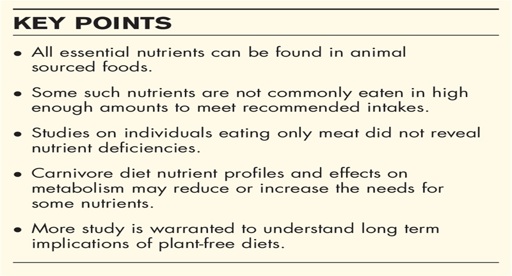A survey of literature and review of the knowledge on nutritional adequacy of the “carnivore” diet.
Purpose of review: The aim of this study was to summarize current contributions affecting knowledge and predictions about the nutritional adequacy of plant-free diets, contextualized by historical accounts.
Recent findings: As demonstrated in recent experiments, nutrient interactions and metabolic effects of ketogenic diets can impact nutritional needs, sometimes resulting in nutrient-sparing effects. Other studies highlight conflicting hypotheses about the expected effect on metabolic acidosis, and therefore mineral status, of adding alkaline mineral-rich vegetables.
Summary: A carnivore diet is a newly popular, but as yet sparsely studied form of ketogenic diet in which plant foods are eliminated such that all, or almost all, nutrition derives from animal sourced foods. Ketogenic diets are already nutritionally controversial due to their near-complete absence of carbohydrate and high dietary fat content, but most ketogenic diet advocates emphasize the inclusion of plant foods. In this review, we discuss the implications of relying solely on animal sourced foods in terms of essential nutrient status.
Key Points
- All essential nutrients can be found in animal sourced foods.
- Some such nutrients are not commonly eaten in high enough amounts to meet recommended intakes.
- Studies on individuals eating only meat did not reveal nutrient deficiencies.
- Carnivore diet nutrient profiles and effects on metabolism may reduce or increase the needs for some nutrients.
- More study is warranted to understand long term implications of plant-free diets
CONCLUSION Every essential nutrient can be found in ASFs, but not always in high levels in commonly eaten ones. Some nutrients are rarer than others and may require planning if the goal is to guarantee meeting established recommended daily allowances. Because of systematic differences in metabolism and food matrix contexts, requirements on a carnivore diet may likewise differ systematically. Historical and clinical data suggest that all acute micronutrient needs can be met without plants, but long-term consequences are unknown. Calcium levels in particular may be compromised over time, and merit further study, especially in order to disentangle effects of acidity, bone growth stimulation and interacting nutrients
Full PDF Here



Notes -
Makes sense, different metabolic contexts may have different requirements
In a plant free context the animal based foods may be even more bioavailable.
Vitamin C is interesting - low levels in meat/ASF, but it has been documented since 1882 in the Lancet that a plant free diet prevents scurvy. Many scurvy symptoms are due to lack of carnitine (which can be derived from vitamin c), but also can be absorbed directly from meat which is a excellent source of carnitine.
A full carnivore diet can be designed to include dairy, small boney fish, bone broth, or egg shells. The evidence is scant, but suggestive that non-ASF calcium intake is a necessity (going back to nomads and intuit examples).
!!! Need to eat the whole animal, including the organs, NOT just the meat.
On the whole its a good opinion piece, a survey that includes the literature up to 2020, and covers the ongoing debate and nutrients of concern.
I’ve never read a paper that didn’t merit further study, but in this case I think its uniquely urgent.
I think the current state of science is - Carnivore diets work in individuals and historic populations, but it goes against modern nutritional doctrine, and isn’t explained by current nutritional theories. i.e. merit’s further study (lol)
They reference two papers that look very interesting, where carnivore was applied in clinical settings with already sick patients and did well, I’ll put these onto my reading agenda.
To´ th C, Clemens Z. A child with type 1 diabetes mellitus (T1DM) successfully treated with the paleolithic ketogenic diet: a 19-month insulin-freedom. Int J Case Rep Images 2015; 6:752–757.
To´ th C, Dabo´ czi A, Howard M, et al. Crohn’s disease successfully treated with the paleolithic ketogenic diet. Int J Case Rep Images 2016;7:570–578.